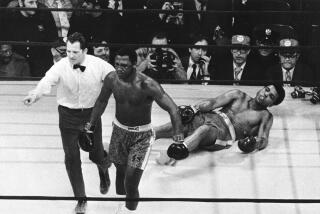Given a Fighter’s Chance, Louis Made Most of It
- Share via
He was born in 1914 into a family of Blackfoot and Cherokee Indian/African American heritage, in rural eastern Alabama, where he worked the cotton fields until he was 12.
When his family moved to Detroit, the young boy, Joseph Louis Barrow, learned to box in the Brewster Gym. Shortly afterward his name was changed to Joe Louis, for a better fit on boxing posters.
Louis, who died 18 years ago today at 66, turned pro in 1934 and launched one of the great sports careers of the 20th century. He won the world heavyweight championship in 1937 and was 25-0 in championship bouts until defeated by Ezzard Charles in 1950.
On anyone’s list of 10 classic boxing bouts, Louis has to appear at least twice:
* His 1938 rematch at Yankee Stadium with Max Schmeling, who’d knocked him out in 1936, when neither man held the title. Louis, now champion, launched a savage attack from the opening bell and registered a dramatic, first-round knockout.
* His 1941 match with light-heavyweight Billy Conn. Louis knocked Conn out in the 13th round after Conn, far ahead on points, became careless.
But for all his great victories, Louis had one failing that followed him to his grave. For all his talent as a fighter, he was poor at managing money.
Ten times as champion he earned more than $100,000 in purses.
He was a free-spender and a soft touch for anyone with a sad tale. Inevitably, his careless ways led to interminable battles with creditors, not the least of which was the Internal Revenue Service.
Joseph Louis Barrow, because he boxed in so many military exhibitions in World War II, was buried at Arlington National Cemetery. Lying next to him is actor Lee Marvin, a marine decorated for heroism in the Pacific.
More to Read
Go beyond the scoreboard
Get the latest on L.A.'s teams in the daily Sports Report newsletter.
You may occasionally receive promotional content from the Los Angeles Times.










